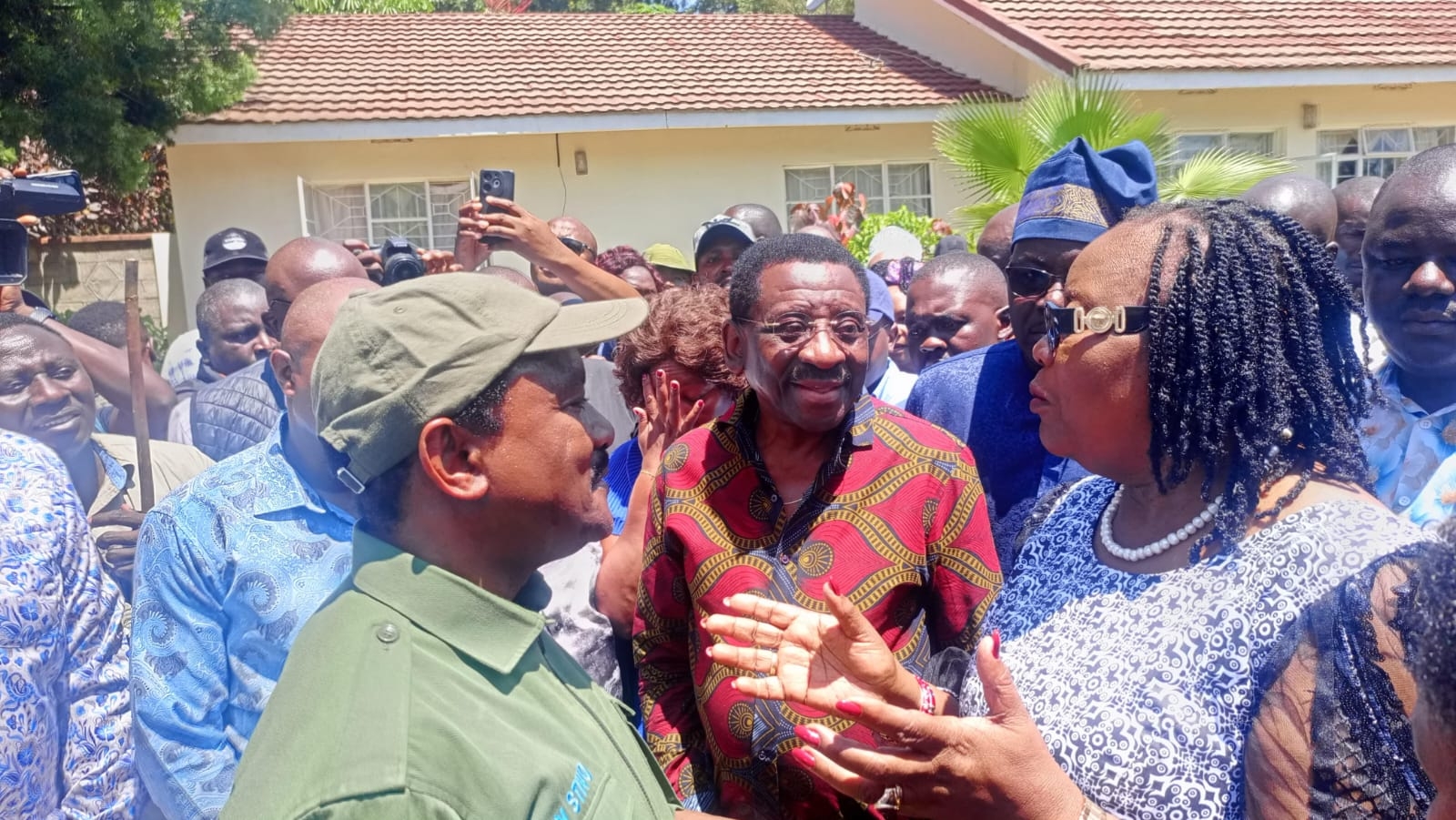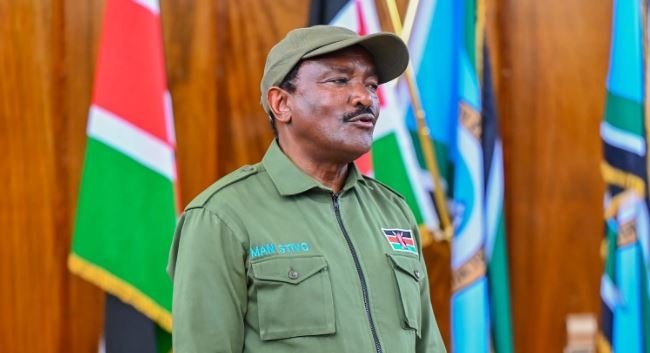Unity is strength. So goes an old adage. Towards attaining it, the African Independent Pentecostal Church of Africa is determined to walk the talk that will usher in a new dawn as the church clocks 100 years of existence next month.
With a new leadership in place, a fully functional Constitution and other structural instruments key in fostering unity and progression of the church, the top church leaders can only exude confidence of brighter days ahead.
There were reports that the church was for long plunged into a protracted leadership feud, with its wrath often unleashed and manifested in the form of physical fights, bitter exchange of words and property destruction.
Its followers frequently converted the holy grounds into battlefields in defence of their preferred high or low-ranking spiritual leaders. The spawning of up to 70 dioceses with each unit headed by a bishop was yet another effect of the division.
The leadership scramble roped in the church’s overseer’s slot. At some point, it took the intervention of the state to broker a truce that led to a one-year rotational leadership pact among three archbishops, namely Julius Njoroge, Samson Muthuri and Fredrick Wang’ombe, who were placed at the centre of the leadership row.
A leadership pact implemented from 2020 to 2023 allowed the three clerics to each lead the church for a year before the recently held election in November 2023, in which Archbishop Samson Muthuri won with a landslide victory.
HOW IT STARTED
The AIPCA was founded in Nyeri county with the aim of countering the effects of Western cultures that missionary-inspired churches introduced countrywide. It would later become the epicentre of the country’s struggle for Independence.
AIPCA supreme secretary general Bernard Mwangi traces its formation to indigenous Africans who fell out with missionaries. They were disgruntle with the rate at which the African culture was being eroded by the Western culture, whose uptake was rapidly increasing.
“It was founded with the aim of helping to unshackle Africans from the grip of the Western culture,” he told the Star.
“It also felt like the Western religion was being used as a tool to interfere with Africans’ political and social activities.”
Upon its establishment in 1924, Phillip Kiande and David Gachukia were ordained as the first religious leaders by the Orthodox Archbishop William Alexander. The first church was set up in Amboni village and its first theological school in Kiriti, both in Nyeri county.
The agitated religious outfit would then plant parallel branches across all missionary-inspired churches to aggressively push its agenda. Through the mission, the church equally became a buttress cornerstone and a reckoning force of rebellion against the colonial government.
In 1952, while at the height of the country’s struggle for Independence, the church would be banned by the colonial government and declared an illegal entity due to its involvement in political activities and clamour for Independence. Some church leaders were detained, while others were killed.
Mwangi says the ban took effect in the next 10 years up to 1963, when Kenya gained Independence. In a free country, the church was revived and named the African Independent Pentecostal Church of Kenya (AIPCK). Later it was renamed the African Independent Pentecostal Church of Africa (AIPCA) upon its registration in 1969.
Within the 10-year period when its activities were banned, the church was hit by a series of misfortunes. These include the loss of its property, including about 300 schools, which were put under the management of rival mission founded by mainstream churches.
Just like the political front, where there was the recruitment of home guards to betray their own and collaborate with the colonialists, a similar system was applied in the church
HISTORY OF DISUNITY
Until recently, the ghost of disunity had long plagued the church. Oftentimes, the church would be embroiled in leadership wrangles. But Mwangi says nothing is coincidental.
He says the colonial government sowed seeds of discord in the members, using the divide-and-rule model to disintegrate the church and forestall its mission.
“Just like the political front, where there was the recruitment of home guards to betray their own and collaborate with the colonialists, a similar system was applied in the church,” Mwangi said.
He is, however, quick to acknowledge the church’s work on progress to bury the hatchet and move on as one.
“Great milestones have been achieved. The teething problems are not liturgical but administrative, and that is the reason we have in place a structured constitution to help address the challenges.”
Additionally, he said that unlike other mainstream churches, which cascade their administrative directives from top to bottom, the AIPCA had long struggled to accept the guidance of a supreme leadership.
“This is mainly because it was started from the grassroots, and that explains why some of the local church leaders wielded power more than some high-ranked administrators,” Mwangi said.
He says with the goodwill of the clergy and the church membership, the future can only be better if not the best. He additionally applauded the government for its commitment in facilitating peace talks that have significantly brought order in the church.
Mwangi says the church has three Archdioceses, namely Nairobi Archdiocese, Eastern Archdiocese and Thika Archdiocese, which are currently headed by Archbishops Fredrick Wang’ombe, Samson Muthuri and David Njuguna, with Archbishop Muthuri at the helm of the church’s leadership.
STEADYING THE SHIP
In an exclusive interview with the Star, Archbishop Muthuri, whose inauguration preceded a historic November 2023 election victory, says over and above his constitutional mandate, his primary role in his three-year term will be to offer sound administrative leadership as well as cultivate unity among leaders and members.
He said the willingness by the more than 3.5 million congregants to adhere with the dictates of the constitution will ease his work, thus fast-tracking the reconciliation process.
“Unlike the years past, where wanton disregard of the laid-out church directives were blatantly looked down on due to the far-ranging division, members unanimously resolved to follow to the hilt the constitution they crafted by themselves,” Muthuri said.
“The renewed commitment and cooperativeness can only signify a ray of light at the end of the tunnel.”
The general overseer said the church has made remarkable progress despite a few disputes still rocking some churches.
The wrangles are not severe in nature and are being resolved, he said. Mechanisms put in place by the constitution, which requires members to follow the guidance of their respective administrative heads, are helping to eradicate the menace.
“The wrangles have significantly reduced in our churches and even the few divisive simmering undertones in a few churches do not pose danger to the course of unity of the church because they are being attended to,” Muthuri said.
“Assessing our progress from where we came from, I can attest that we have walked a long journey and are on the right trajectory.”
To help fulfil their mission, they are rejuvenating the operations of key mission groups, ranging from bishops' conferences, women council and the youth groups.
Besides that, the constitutional entrenchment of the education and evangelism dockets is currently being spearheaded by archbishops David Njuguna and Fredrick Wang’ombe, who were his election competitors.
This will go a long way in not only restoring decorum and strengthening the structural administration operations of the church but also enabling the church to spread its wings beyond Kenya’s borders, Muthuri said.
He says through the evangelical docket, they look forward to opening more branches across Africa and beyond. Currently, there is only one functional AIPCA church in the USA.
“We are supposed to have 35 dioceses in the country but due to the past wrangles, we ended up with almost double the number,” he said.
“In that regard, we are progressively working on it so that we can scale them down to attain a number that is in line with the constitution.”
He rallied the members to join hands and maintain peace as that is the core priority. Equally, he assured that his administration will do its level best and abide by the law to move the church to the next level of prosperity.
PRAISE FOR PROGRESS
Former and now retired Archbishop Julius Njoroge praised the progress made in attaining peace and stability in the church. He also cited his contribution towards finding a lasting solution.
“I can confidently say that I not only left as a content person but I equally left a very stable and peaceful church because all the efforts for finding a lasting solution had finally paid off,” he told the Star.
“Besides the introduction of a constitution, there was seamless transition of leadership and decorum was highly observed while conducting elections for a national archbishop.”
Central regional commissioner Fredrick Shisia, who has been the government’s emissary in the peace talks, commended the effort achieved so far, noting that the constitution in place provides a clear roadmap and a decisive action plan of putting everything in order.
Additionally, he noted that the scuffles that have happened in a few churches are not cause for alarm, saying they are taking the cases positively as they are helping the team monitor the progress.
“When you are trying to bring order in a place that has long been characterised by chaos, such minor skirmishes are meant to happen in the initial stages,” Shisia told the Star on the phone.
“So we are taking them positively and appropriate measures have been taken to resolve them.”
He also hailed the church membership for its willingness to work for the sake of the prosperity and unity of the church.
This will help it achieve its purpose as a voice of reason in society as well play its key mandate in preaching the gospel, he said.


















